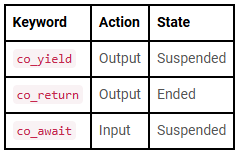Trainings at using std::cpp 2026 with Mateusz Pusz and Jeff Garland
Once more the using std::cpp conference is here and they bring two interesting training workshops.
-
Mastering std::execution: A Hands-On Workshop by Mateus Pusz.
https://www.fundacion.uc3m.es/formacion/mastering-stdexecution-a-hands-on-workshop/ -
Function and Class Design with C++2x by Jeff Garland.
https://www.fundacion.uc3m.es/formacion/function-and-class-design-with-c2x/
Both workshops happen in the post-conference day on March 19th in Madrid.
You may also want to have a look to the list of speakers for the main conference.
If you are one of the first 20 attendees to each workshops, your are eligible for a free ticket for the main conference.


 Conferences are never just about the talks — they’re about time, travel, tradeoffs, and the people you meet along the way. After a year of attending several C++ events across formats and cities, this post is a personal look at how different conferences balance technical depth, community, and the experience of being there.
Conferences are never just about the talks — they’re about time, travel, tradeoffs, and the people you meet along the way. After a year of attending several C++ events across formats and cities, this post is a personal look at how different conferences balance technical depth, community, and the experience of being there. C++20 introduced coroutines. Quasar Chunawala, our guest editor for this edition, gives an overview.
C++20 introduced coroutines. Quasar Chunawala, our guest editor for this edition, gives an overview. Filtering items from a container is a common situation. Bartłomiej Filipek demonstrates various approaches from different versions of C++.
Filtering items from a container is a common situation. Bartłomiej Filipek demonstrates various approaches from different versions of C++. std::chrono::high_resolution_clock sounds like the obvious choice when you care about precision, but its name hides some important caveats. In this article, we’ll demystify what “high resolution” really means in <chrono>, why this clock is often just an alias, and when—if ever—it’s actually the right tool to use.
std::chrono::high_resolution_clock sounds like the obvious choice when you care about precision, but its name hides some important caveats. In this article, we’ll demystify what “high resolution” really means in <chrono>, why this clock is often just an alias, and when—if ever—it’s actually the right tool to use.